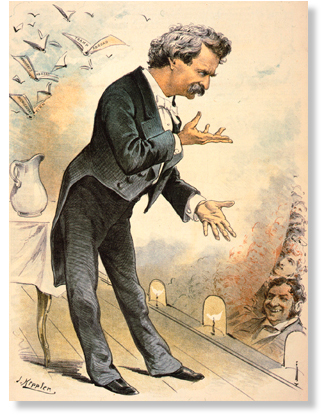Mark Twain

Perhaps what makes Mark Twain stand out in American literature is that he made no apologies for his writing. In the preface to one of his books, he tells the reader that he has written “honestly, whether wisely or not.”
Almost all his life, Twain wrote about things he knew and with which he was familiar. In The Adventures of Tom Sawyer, the main character was based on three boys whom Twain knew as a child and the book incorporated events that the author himself had experienced growing up in Hannibal, Missouri.
In The Innocents Abroad, Twain applied his unique brand of humor to describe the people with whom he traveled and the cultures to which he was introduced in Europe, the Holy Land, and Egypt. Roughing It focused on Twain’s experiences in the West during the Civil War years. A trip he took down the Mississippi River turned into Life on the Mississippi. Visits to England provided Twain with the setting for two books, The Prince and the Pauper and A Connecticut Yankee in King Arthur’s Court. People all over the world loved his humor and his realism.
Twain began Adventures of Huckleberry Finn as a sequel to Tom Sawyer. But while on a trip down the Mississippi River in 1882, Twain realized something: Despite nearly 20 years since the end of the Civil War (1861–1865) and the constitutional amendments that recognized African American men as citizens, blacks were still not treated equally. Twain understood the power that a storyteller has over his audience, and he realized he had something to say. He used Huckleberry Finn to take a hard look at the evils of racism, which he found appalling.
When Adventures of Huckleberry Finn was published in 1885, it was not well received. In fact, some states banned it as immoral. It remains controversial for the words it uses when describing African Americans. And some people see Twain’s portrayal of Jim, a black slave, as reinforcing racist stereotypes.
But Twain crafted the piece to give his characters real, everyday voices. Huck Finn and Jim share a more civilized society on their simple raft than do the people with whom they come in contact, both on the Mississippi River and at various points along the shore. Huck learns to shed his prejudices and to see Jim as a human being, not an inferior runaway slave. Jim proves to be a wise and caring friend. Today, the book is considered Twain’s greatest work.
Twain’s publisher dubbed him “The People’s Author” because of the way people related to his writing and observations. He stored up scenes and noticed people’s clothing, behavior, and mannerisms. He spent his life describing and reporting on a rapidly changing world. This ability to see things and to capture them so realistically—while also adding his unique, humorous spin—earned Mark Twain the title “father of American literature.”
And Let’s Not Forget . . .
Walt Whitman
Walt Whitman has been called a poet of democracy and the father of free verse. His poetry broke the traditional mold of even meter and rhyming words. Instead, it offered everyday phrases in a loosely constructed, flowing format. He wrote so that working people could be moved by his ideas. Whitman’s poetry explored real things in the 19th century, touching upon everything from the local butcher and policeman to Whitman’s hopes for an emerging United States to the tragedy of the Civil War and President Abraham Lincoln’s assassination. Walt Whitman’s dynamic voice replaced romantic poetry with realistic verse, forever changing how the world defined poetry.